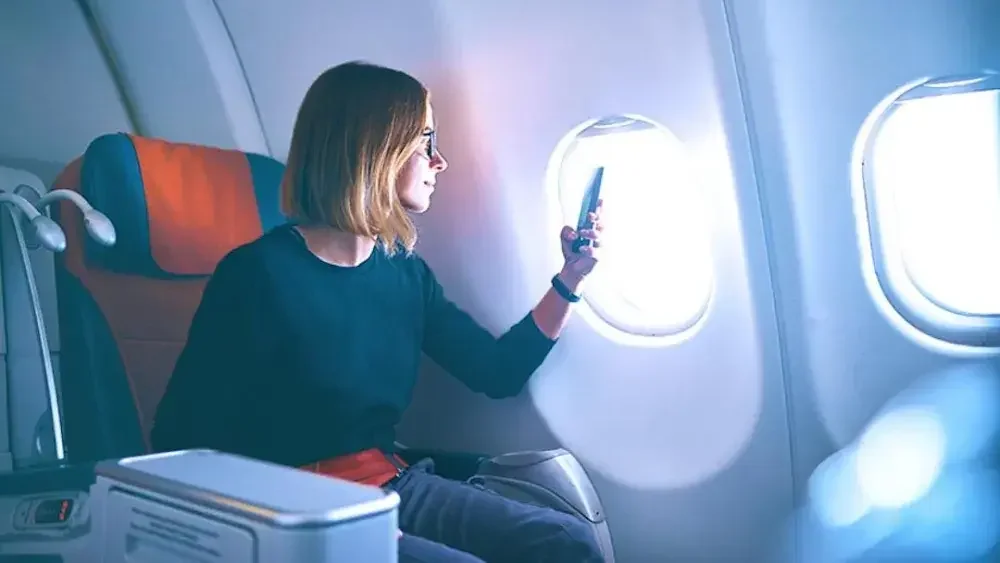Business travel is back after the pandemic, and with that increase comes the age-old question every business traveler must ask at least once: "What can I deduct as a business expense while I'm on the road?"
You've likely heard the term "write-off" somewhere and may have used it somewhere within your business circles. But what exactly is it? You might wonder if you can book first-class travel or five-star lodging and eat in fancy dining establishments and then submit them as business write-offs. The short, overarching rule for those specifics is no, you probably cannot, but there is more to eligible business travel expenses than that.

So before you book travel arrangements on your credit card (hopefully a designated business credit card), read on for more information about making expensing your business travel less stressful.
Key takeaways
- Understand IRS guidelines for deductible travel expenses to maximize tax savings.
- Proper documentation is essential for claiming deductions, including meals and entertainment, with a clear business justification.
- Utilize tax professionals and leverage technology to ensure accurate deductions, compliance with laws, and maximum savings on travel expense deductions.
What is business travel or a business trip?

Simply put, business travel or a business trip is defined as any travel conducted that is business-related. To be considered eligible as a business trip, the travel itself must meet the following criteria:
- The trip must be conducted for legitimate business purposes, not as leisure time, vacation, or personal purposes.
- The trip must occur outside the bounds of a regular commute to and from work (or the main place of business) and home.
If the trip meets these criteria, it falls under the category of a business trip. It also means that you can deduct travel expenses whether you are a business owner sending an employee on your behalf or a self-employed individual.
What is a business-related travel expense?
To better understand business-related travel expenses, it's a good idea to look at overall business expenses. A business expense is incurred as part of the regular day-to-day operations of your employer (or for you if you are a self-employed individual) to conduct the business. Under current Internal Revenue Service (IRS) laws, special rules allow portions of business expenses to be deducted from the overall business income. These expenses are considered tax deductible, which means they are applied before any taxes are. The umbrella term "write-off" comes from this business tax deduction category.
In business, eligible tax deductions can have a significant impact. Being able to deduct expenses can often reduce the total overall taxable income. Cumulatively, tax-deductible expenses will likely reduce the total bill when it is time to file your tax return.
A deductible business travel expense is one that you or an employee incur during travel directly related to conducting business. In both instances (a business expense or a business travel expense), it is essential to ensure the expense falls under the category of being for bona fide business purposes. This means that deducting the travel expenses must be something genuinely related to conducting or doing a bona fide business purpose. If it is, its cost can be written off as part of business or business travel-related expenses. It applies to self-employed individuals or employees traveling for an employer or business owner.
So what exactly can you expense?
What business travel expenses are tax deductible?

First and foremost, consider the basics, or the "Big 3" in business travel. Essentials here include these three actual expenses: costs related to how you will get to your destination (travel), where you will stay (lodging), and what you will eat and drink when you are there and in transit. Each category within the Big Three can be an eligible travel expense and, therefore, a tax write-off, but they come with some criteria worth exploring.
Transportation expenses: If you plan to travel by car, and you will either use a vehicle you lease long-term or your car, there are two choices related to how this mode of transportation might be expensed. One choice is known as the “standard mileage rate." Under current IRS allowances, the standard mileage rate deduction for self-employed individuals and employees is 65.5 cents per mile for business-related travel. The rate per mile would apply to any driving conducted to or from the business destination. It would also apply to any driving conducted while you are at the destination if it is business-related. For instance, once at the destination, if driving must be done to run errands, those miles can be added to the total mileage count.
The other vehicle expense option for a business trip is to itemize the individual expenses. Eligible business costs, in this instance, include the lease, insurance, fuel, costs related to the upkeep and maintenance of the vehicle, such as oil changes or tune-ups, and any major repairs on the vehicle, such as fixing a flat tire.
If you are renting a car as part of your transportation expenses and it falls under the ordinary and necessary business travel expense category, the cost to rent a car would qualify as an eligible business expense. Other vehicle-related expenses that qualify for travel deductions include tolls and parking fees.
Actual expenses method
The actual expenses method involves calculating the total cost of vehicle use and multiplying it by the percentage used for business purposes. This includes:
- Depreciation
- Licenses
- Tires
- Garage rent
- Gas
- Oil
- Towing
- Insurance
- Vehicle registration fees
- Lease payments
- Fees
- Repairs
To calculate the percentage of business use, divide the total business miles driven by the total miles driven in the year. While this method can lead to larger deductions, it requires detailed record-keeping and more complex calculations than the standard mileage method.
Standard mileage rate
The standard mileage rate allows you to claim a fixed rate per mile driven for business purposes, plus parking fees and tolls. The standard mileage rate for business in the United States is 65.5 cents per mile. The IRS determines This rate annually based on a study of the fixed and variable costs of operating a vehicle for business reasons, such as gas, maintenance, and depreciation.
This method can be used for self-employment, business-related travel, or when using a vehicle for work as an independent contractor. However, personal use of the vehicle is not eligible for this deduction.
Ticketed travel: For ticketed travel, like flights or trips by train, the cost of your ticket can be expensed as a travel deduction if your class fare qualifies as an eligible and reasonable expense. This means that while you likely won't be able to deduct first-class fare, you can deduct what is known as the ordinary and necessary expense related to the fare, which covers classes such as economy. You can also expense costs incurred while en route, such as baggage fees. And, if you are waiting at an airport or train station, any meal costs, snacks, or drinks would also qualify as business-related expenses.
Meal expenses and entertainment: Business meals cut eligible business expenses but with some stipulations, including the standard meal allowance. While current IRS laws permit for up to 50% of a business meal to be deducted, like ticketed travel, rental cars, and other business-travel-related costs, the meal must fall under an ordinary and necessary expense to be eligible as a tax-deductible business expense. If you are tempted to go all out and splurge on your dining, you might find that it is not an eligible business travel expense.
But changes have been made to the entertainment category. While entertainment used to be an allowed business expense, it is sometimes no longer eligible to claim tax deductions. This means that if you expect to take clients out as part of client meetings or conduct business, be sure to read the fine print since you might discover you cannot claim entertainment as a legitimate business expense.
Lodging expenses: Business travelers must consider where they will sleep while away. To be considered eligible as a business expense, the location of your stay must be outside of the main place of business and require overnight accommodation. Notably, in this expense category, IRS rules stipulate that for it to be an eligible business expense, the lodging cannot fall into the extravagant or considered recreational category.
Remember: With each of the "Big 3" and all other related business expenses to be deducted, the expenses must be ordinary and fall under the category of reasonable business expenses. If you opt for pricey vehicles, tickets, meals, and rooms instead of the available moderately-priced alternatives, you risk losing eligibility as legitimate business expenses.
Are there other tax deductions for travel expenses?
There are some other expenses anyone traveling for business should consider submitting as tax-deductible expenses.
Event fees: These could come into play if you travel to an event such as a conference, convention, or trade show. In addition to the Big 3, certain expenses related to attending these events would qualify as eligible business travel expenses. The expenses are deductible if the event has an entry or booth fee. While you are there, if you attend workshops, lectures, or courses that require materials such as a workbook or registration, these would also be eligible as tax-deductible travel expenses. And, if you are running a booth or table at an event and need materials or supplies, the cost to purchase them would also qualify as legitimate business expenses.
Incidental expenses: Any reasonable additional expenses you incur while traveling for a business activity can be considered incidental expenses. For instance, if you incur expenses on ground transportation, a rideshare fee, taxi fare, or a subway ticket qualify as business expenses. Laundry and dry cleaning services are also eligible business activities. In addition, indirect expenses like office supplies can be eligible business expenses.
Tracking expenses on your business trip
Organization before, during, and after the business trip will help you avoid potential pitfalls or headaches when filing expenses or taxes. From the outset, one great way to separate your business trips and expenses from personal expenses is to have a single credit or debit card that you designate for business use only. This de facto "corporate" card will come in handy and be a best friend on the road since it automatically creates a tally of itemized expenses courtesy of the real-time accounting and monthly statements that come with it.
Beyond the lone card designated for business expenses, your meticulous record-keeping will greatly help you when it's time to account for everything. If you don't want to use a third-party software program or expense-tracking app to track your expenses, a simple solution is to use a basic spreadsheet that tracks the date, the reason for the expense, and the cost. To set this up, once you have incurred an expense, note it down using the aforementioned basic information.
While on the trip, another simple organizational tool is keeping all receipts and other applicable hard-copy records and materials in one designated place. A pouch or envelope will work fine as the place to keep these items. Make sure you read the receipt or record, and if it does not have information such as the name and address of the business, write it on the back before you stash it away. Finally, if a receipt is for something like a business lunch, ensure the date and information about the place of business are on the receipt. Then, write the name of the person you shared your time with and the reason for meeting up somewhere on the receipt.
Importance of documentation
Claiming travel expense deductions requires proper documentation. This includes retaining receipts and records for all expenses incurred during your business trip. For meals and entertainment expenses, you'll need to note the nature of the meeting, including who you met with, when, and the topics discussed.
It's worth noting that lodging expenses on non-business days may still be eligible for deductions if specific strategies are employed, such as incorporating “vacation days" between workdays. In such cases, the total cost of lodging for the trip can still be tax deductible even when no work is taking place on the weekend. However, meals and entertainment expenses without a clear business justification won't be deductible and must be paid personally.
Combining business and personal travel

Allocating expenses between business and personal activities is essential to ensure accurate deduction claims. Expenses must be allocated based on actual usage, so the non-business portion of the expenses may be viewed as taxable income if paid by the individual or company.
To accurately allocate expenses between business and personal activities for tax deductions, follow these steps:
- Track usage for a period of time.
- Determine the allocation by proportionally dividing the expenses based on the amount of business and personal use.
- Maintain proper records to support the allocation.
When combining business and personal travel, careful allocation of expenses and adherence to specific rules is important. Expenses related to the personal nature of the trip cannot be deducted; only those incurred for business purposes can be.
If traveling abroad, you must spend a minimum of 25% of your time conducting business to qualify as a business trip and claim travel expense deductions. If you conduct business for less than 25% of the time while on a trip, you can still deduct travel costs. This deduction must be proportional to the amount of time spent on business.
Rules for international travel
International travel has additional rules to consider when claiming travel expense deductions. As mentioned, you must spend at least 25% of your time abroad conducting business to claim travel-expense deductions.
If you use 25% or less of your trip for business purposes, you can deduct related travel costs in proportion to the time spent on work. This can help to make international business trips more affordable. For example, if 40% of your time is spent on business activities, you can claim the entire cost of airfare as a business expense.
Special considerations for self-employed individuals
Self-employed individuals should be aware of special considerations when deducting travel expenses, such as home office deductions and computer rental fees. Understanding these unique aspects can help self-employed individuals maximize their tax savings and ensure compliance with tax laws, especially regarding their tax home.
Home office considerations
Home office deductions can be claimed if the office is the primary place of business and is regularly used for business purposes. The IRS has specific guidelines for the regular use of a home office for business purposes, such as the office being used exclusively and regularly for business purposes.
To claim a home office deduction, you can use the simplified method the IRS provides. Here's how it works:
- Multiply the allowable square footage of your home office by the prescribed rate of $5 per square foot.
- The maximum allowable square footage is 300 square feet, so the maximum deduction you can claim using this method is $1,500 annually.
- The simplified option allows for a standard deduction without the need for detailed record-keeping.
Deducting computer rental fees
Computer rental fees can be deducted if the equipment is used for business during the trip. The full cost of the computer rental may be deducted as a business expense.
To claim a deduction for computer rental fees from business travel expenses, you must provide relevant documentation demonstrating the rental fees paid, such as receipts or invoices. Proper record-keeping is essential to support your deduction and ensure compliance with IRS regulations.
Leveraging technology
Technology, such as expense tracking apps and online bookkeeping services, can simplify record-keeping and documentation for travel expense deductions. These tools can help you track and categorize expenses, making it easier to identify and compute deductible expenses for tax purposes.
Expense tracking applications can:
- Generate reports and summaries of travel expenses
- Be beneficial for tax filing and auditing purposes
- Save time and effort in tracking and documenting your travel expenses
- Ensure accurate deductions and compliance with tax laws
Leveraging technology in expense tracking can be a valuable tool for managing your finances.
Getting help with tax deductions for travel expenses
Sometimes, you might need more help. This guide provides basic questions about business travel deductions and expenses. Still, you are not alone if you have other questions about what might qualify as a tax-deductible business expense. There are experts at LegalZoom who can answer specific questions and better advise you about both business expenses and business travel-related expenses.
You might have questions about whether specific costs related to your business qualify as ordinary and necessary expenses or wonder if percentages of a certain expense or the entire cost can be completely deductible. Additionally, professionals in the know about things like a specific tax home can help you sort out concerns related to your business so that you can always claim the proper travel expenses. For any consultant looking to get back into the swing of travel, help and practical tips are just a click away.
Summary
Understanding and maximizing travel expense deductions can save you significant money on your tax return. By familiarizing yourself with the requirements, maintaining proper documentation, and leveraging the expertise of tax professionals and technology, you can ensure accurate deductions, compliance with tax laws, and, ultimately, keep more money in your pocket.
Frequently asked questions
What kind of travel expenses are tax deductible?
Tax deductible travel expenses include airfare, train/bus fares, taxi rides between an airport or station and a hotel, or from the hotel to a work location.
What are the three requirements for a traveling expense deduction?
To qualify for a traveling expense deduction, you must have a “business trip," leave your tax home, have most of the trip business-related, and plan the trip in advance.
How do I prove travel expenses for taxes?
To prove business travel expenses for taxes, use credit card slips with notes on the business purpose made at the time of incurring the expense.
Are daily travel expenses tax deductible?
Daily travel expenses from your home to a regular place of business are not tax deductible. However, you can deduct transport expenses when traveling between your home and a temporary work location outside the metropolitan area where you live and normally work. Additionally, ordinary and necessary travel expenses incurred while away from your home and your main place of business can be deducted.
How do I allocate expenses between business and personal activities during a combined trip?
Allocate expenses proportionally based on the amount of business and personal use for a period of time, and maintain proper records to support deductions.
